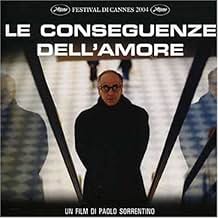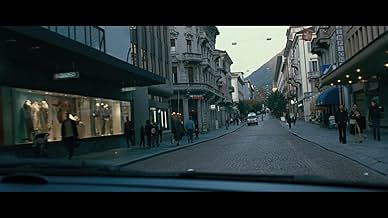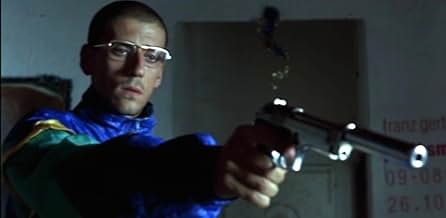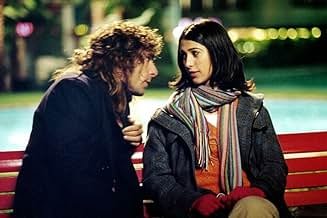NOTE IMDb
7,5/10
20 k
MA NOTE
La vie d'un introverti change complètement quand il se trouve attiré par une jeune serveuse.La vie d'un introverti change complètement quand il se trouve attiré par une jeune serveuse.La vie d'un introverti change complètement quand il se trouve attiré par une jeune serveuse.
- Réalisation
- Scénario
- Casting principal
- Récompenses
- 20 victoires et 21 nominations au total
Vincenzo Vitagliano
- Pippo D'Antò
- (as Enzo Vitagliano)
Avis à la une
I saw this interesting film back to back with the Chinese/French film "2046" at the recent Dubai Film festival. Both were intelligent works made the same year (2004/2005). Both had the main characters living in a "hotel". In both films, the hotel is more a metaphor of exile than a location. Both dealt with love between a man and a woman. Both had wonderful music and riveting performances. What a coincidence and yet how the two films differ in treatment of the subject!
Somewhere at the beginning of the film, a man walking on a pavement turns to look at a woman and in doing so hits a lamp post. The audience erupts into a volcano of laughter innocently. But isn't that brief shot the synopsis of the film, that entertains you for 2 hours? While the film is a wonderful blend of black comedy (e.g., using a stethoscope to listen to a neighbor's conversation in the adjoining hotel room), the film builds on what Buster Keaton and Jacques Tati had introduced to cinema earlier--stoic faces that leads to comedy quite in contrast to the equally intelligent world of Robin Williams or the heartwarming Danny Kaye. A sudden frenzy of activity transforms an otherwise stoic character while moving money from the hotel to the bank is reminiscent of Tati's works.
But the film is not mere comedy. The anti-automation statement (cash counting and the reaction of the bank staff to the statements relating to it, the dummy that acts as an ineffectual warning to the speeding lady, the reference to "Moulimix" as the fictitious "company" he works for, etc.) are several cues that the director is offering a loaded comedy to the viewer. Laugh, yes, but reflect on it and enjoy further..
The movie's strength lies in is brief, staccato script (by director Paul Sorrentino) that offers comedy that is mixed with philosophy ("Truth is boring," "Dad is dead, but nobody told him," "Bad luck does not exist--it is the invention of the losers and the poor". Then the director goes on to provide you with a fascinating lecture from the main character on insomniacs. You will not sleep through this lecture.
Sorrentino provides entertainment pegged to the subject the Italians know best--the Mafia. It is an existential mafia film.
There is a loaded philosophical sequence where a young girl, sitting opposite the lead character Titta Di Girolamo, reads aloud a passage from a book: "Whatever he wants can happen. What a fine mess. That is the advantage of using memories to excite oneself. You can own memories, you can buy even more beautiful ones. But life is more complicated, human life especially so, a frightening, desperate adventure. Compared to this life of formal perfectionism, cocaine is nothing but a stationmaster's pastime. Let us return to Sophie.. We become poetic as we admire her being, beautiful and reckless, the rhythm of her life flowed from different springs than ours. Ours can only creep along, envious. This force of happiness both exciting and sweet, that animated her, disturbed us. It unsettled us in an enchanting way, but it unsettled us nevertheless. That's the word." The reaction of Titta to the passage is interesting. Titta is himself a cocaine addict. Titta looks at the barmaid of the hotel-his own "formal perfectionism." The following sequence is of Titta calling his own wife and daughter on the phone--a conversation filled more with silence than words. They, too, are Titta's "memories." The final sequence of the film is of Tittas' best friend Dino Guiffre working alone repairing a fault on an electricity pylon in biting wind in a snowy landscape--recalling his own best friend Titta. This is a film about friendship that transcends the mafia.
Since "Truth is boring", the director provides a dessert as part of the fine meal of superb acting (Toni Servillo), good music, clever camera-work (Luca Bigazzi), a beautiful, enigmatic actress (Magnani, grand-daughter of the great, immortal beauty Anna Magnani) and powerful script. The dessert is for the viewer to figure out the truthful feelings of Titta, towards his family members, towards his hotel guests, towards the bar girl, towards the mafia, towards the bankers, towards the hotel owner, and towards his best friend Dino. (Assuming that the viewer accepts the eventuality of how Titta recovered his suitcase from the goons, how does he get inside his car and get it covered with its synthetic cover while he is still inside it?) Perhaps it is Sorrentino's admitted love for the literary works of Louis- Ferdinand Céline that has sculpted the character of Titta. The film's end will remain an enigmatic one for a reflective viewer.
Somewhere at the beginning of the film, a man walking on a pavement turns to look at a woman and in doing so hits a lamp post. The audience erupts into a volcano of laughter innocently. But isn't that brief shot the synopsis of the film, that entertains you for 2 hours? While the film is a wonderful blend of black comedy (e.g., using a stethoscope to listen to a neighbor's conversation in the adjoining hotel room), the film builds on what Buster Keaton and Jacques Tati had introduced to cinema earlier--stoic faces that leads to comedy quite in contrast to the equally intelligent world of Robin Williams or the heartwarming Danny Kaye. A sudden frenzy of activity transforms an otherwise stoic character while moving money from the hotel to the bank is reminiscent of Tati's works.
But the film is not mere comedy. The anti-automation statement (cash counting and the reaction of the bank staff to the statements relating to it, the dummy that acts as an ineffectual warning to the speeding lady, the reference to "Moulimix" as the fictitious "company" he works for, etc.) are several cues that the director is offering a loaded comedy to the viewer. Laugh, yes, but reflect on it and enjoy further..
The movie's strength lies in is brief, staccato script (by director Paul Sorrentino) that offers comedy that is mixed with philosophy ("Truth is boring," "Dad is dead, but nobody told him," "Bad luck does not exist--it is the invention of the losers and the poor". Then the director goes on to provide you with a fascinating lecture from the main character on insomniacs. You will not sleep through this lecture.
Sorrentino provides entertainment pegged to the subject the Italians know best--the Mafia. It is an existential mafia film.
There is a loaded philosophical sequence where a young girl, sitting opposite the lead character Titta Di Girolamo, reads aloud a passage from a book: "Whatever he wants can happen. What a fine mess. That is the advantage of using memories to excite oneself. You can own memories, you can buy even more beautiful ones. But life is more complicated, human life especially so, a frightening, desperate adventure. Compared to this life of formal perfectionism, cocaine is nothing but a stationmaster's pastime. Let us return to Sophie.. We become poetic as we admire her being, beautiful and reckless, the rhythm of her life flowed from different springs than ours. Ours can only creep along, envious. This force of happiness both exciting and sweet, that animated her, disturbed us. It unsettled us in an enchanting way, but it unsettled us nevertheless. That's the word." The reaction of Titta to the passage is interesting. Titta is himself a cocaine addict. Titta looks at the barmaid of the hotel-his own "formal perfectionism." The following sequence is of Titta calling his own wife and daughter on the phone--a conversation filled more with silence than words. They, too, are Titta's "memories." The final sequence of the film is of Tittas' best friend Dino Guiffre working alone repairing a fault on an electricity pylon in biting wind in a snowy landscape--recalling his own best friend Titta. This is a film about friendship that transcends the mafia.
Since "Truth is boring", the director provides a dessert as part of the fine meal of superb acting (Toni Servillo), good music, clever camera-work (Luca Bigazzi), a beautiful, enigmatic actress (Magnani, grand-daughter of the great, immortal beauty Anna Magnani) and powerful script. The dessert is for the viewer to figure out the truthful feelings of Titta, towards his family members, towards his hotel guests, towards the bar girl, towards the mafia, towards the bankers, towards the hotel owner, and towards his best friend Dino. (Assuming that the viewer accepts the eventuality of how Titta recovered his suitcase from the goons, how does he get inside his car and get it covered with its synthetic cover while he is still inside it?) Perhaps it is Sorrentino's admitted love for the literary works of Louis- Ferdinand Céline that has sculpted the character of Titta. The film's end will remain an enigmatic one for a reflective viewer.
I saw this the week it opened four years ago and I really did not know what to expect being unfamiliar with Sorrentino's work at the time. He has created a very intriguing and ultimately moving account of an odd character, one for whom the phrase 'life is for living' no longer applies. It outwitted me at every turn and I was constantly surprised by the story. I enjoyed the pacing very much and the way I was gradually given the pieces to work out what was happening. Tony Servillo is superb, as is Magnani. It opens with a brilliantly stylish wide shot and concludes with a very moving image that takes the movie into sublime territory. I thought long afterwards about the main character and the position he was in and his final fate and I didn't shake it for weeks. I recently bought the film and that final scene where he thinks about his friend gets me every time. I still have yet to talk to anyone who has seen this. It's a shame that it did not reach a wider audience as if this is the direction of Italian cinema it can only be a good thing.
The consequences of love: There is really something special about this film but it's very hard to put your finger on. It is a love story of sorts but not really one i've seen before. It has several love themes running throughout the film. One mans love for a younger woman, a younger mans love for his older brother, the mafias love of money at all costs these are just some that intertwine in a story that has you guessing or rather not knowing where and how it will end. The cast are all superb from Sophia the teasing barmaid to the straight faced-ness of titta the films central character. With simple yet affective camera work bounced off an ever-changing soundtrack that mixes low-fi trip hop with lush orchestral pieces. The style of the film changes beautifully using several styles without ever getting cluttered. Love has never looked so diverse and powerful as the tales we are told rumble towards various conclusions. The director has married old and new into a rich Italian classic.
This is a very visual film. By that I mean that the dialog is sparse, almost to the point of being a silent movie for some very long takes, beginning with the opening shot.
The silences, however, are broken by a stunning sound track that ranges from discordant, staccato beats to a haunting mix of violins, and interspersed with vocals that sound like dreams. It's a feast for the ears as much as for the eyes, one of the early visuals being a man walking along a street, so preoccupied with his interest in a shapely woman, that he walks into a lamppost: one of the consequences of love and a metaphor for what lies in store...
A long time ago, another movie Love Story (1970) -- said that love is never having to say you're sorry. This narrative turns that idea on its head in a number of ways, beginning with the main character, Titta (Toni Sevillo), a seemingly innocuous long-term resident in a plush hotel somewhere in Switzerland. Everyday, week in, week out, he sits at the same coffee table, enjoying the passing world, his cigarettes, his coffee, his solitude and he's been doing it for ten years. He sits, he observes, and once a week he engages in three very surprising activities that you'll find out about when you see this little masterpiece...
Love is explored in another way, in a direct counterpoint to Titta's solitude and reserved nature: two older residents of the hotel are still much in love, but the man wants to die in a spectacular manner when his time comes, while his long suffering wife berates him for cheating at cards with the other guests, one of whom is Titta. Now, Titta knows about their squabbles, their love, the man's cheating, his apologies to his wife, and his whining. How? In a surprising and black-comedic manner...one of those surprise activities I mentioned.
But, this is no comedy, in reality, although it does touch upon the idea of the human comedy in a Balzacian sense: the irony of life and what to do with it. That decision had been made for Titta ten years earlier when he left his wife and began to live in the hotel. He keeps in touch occasionally, and it is clear that he still loves his children (now grown up) and the sorrow in his voice speaks volumes. But, there's something more than just sorrow...
Such a life as Titta's would obviously seem to be utterly boring, and it actually is from many perspectives. It is only when we learn what lies beneath his almost death-like countenance, however, that the horror of his situation hits the viewer between the eyes. But not before we know that the female bartender, Sofia (Olivia Magnani), is very interested in Titta and goes out of her way to pique Titta's interest in her.
And that's when things start to unravel for Titta: he eventually succumbs to her femininity and in doing so discovers, once again, the consequences of love. Ironically, in doing so, he finally realizes what he must finally do with his life, and in a most spectacular fashion.
I know that all of the above is somewhat cryptic; but, to say more would spoil the film and story for you. If you like Italian cinema I love it! I urge you to see this one. The acting is superb; the sound track chills the spine; the camera work is truly innovative; the direction shows the maturity of a true artist.
I know I'll see this movie again, and again...
The silences, however, are broken by a stunning sound track that ranges from discordant, staccato beats to a haunting mix of violins, and interspersed with vocals that sound like dreams. It's a feast for the ears as much as for the eyes, one of the early visuals being a man walking along a street, so preoccupied with his interest in a shapely woman, that he walks into a lamppost: one of the consequences of love and a metaphor for what lies in store...
A long time ago, another movie Love Story (1970) -- said that love is never having to say you're sorry. This narrative turns that idea on its head in a number of ways, beginning with the main character, Titta (Toni Sevillo), a seemingly innocuous long-term resident in a plush hotel somewhere in Switzerland. Everyday, week in, week out, he sits at the same coffee table, enjoying the passing world, his cigarettes, his coffee, his solitude and he's been doing it for ten years. He sits, he observes, and once a week he engages in three very surprising activities that you'll find out about when you see this little masterpiece...
Love is explored in another way, in a direct counterpoint to Titta's solitude and reserved nature: two older residents of the hotel are still much in love, but the man wants to die in a spectacular manner when his time comes, while his long suffering wife berates him for cheating at cards with the other guests, one of whom is Titta. Now, Titta knows about their squabbles, their love, the man's cheating, his apologies to his wife, and his whining. How? In a surprising and black-comedic manner...one of those surprise activities I mentioned.
But, this is no comedy, in reality, although it does touch upon the idea of the human comedy in a Balzacian sense: the irony of life and what to do with it. That decision had been made for Titta ten years earlier when he left his wife and began to live in the hotel. He keeps in touch occasionally, and it is clear that he still loves his children (now grown up) and the sorrow in his voice speaks volumes. But, there's something more than just sorrow...
Such a life as Titta's would obviously seem to be utterly boring, and it actually is from many perspectives. It is only when we learn what lies beneath his almost death-like countenance, however, that the horror of his situation hits the viewer between the eyes. But not before we know that the female bartender, Sofia (Olivia Magnani), is very interested in Titta and goes out of her way to pique Titta's interest in her.
And that's when things start to unravel for Titta: he eventually succumbs to her femininity and in doing so discovers, once again, the consequences of love. Ironically, in doing so, he finally realizes what he must finally do with his life, and in a most spectacular fashion.
I know that all of the above is somewhat cryptic; but, to say more would spoil the film and story for you. If you like Italian cinema I love it! I urge you to see this one. The acting is superb; the sound track chills the spine; the camera work is truly innovative; the direction shows the maturity of a true artist.
I know I'll see this movie again, and again...
OK, I'm Italian but there aren't so many Italian film like this. I think that the plot is very good for 3/4 of the film but the final is too simple, too predictable. But it's the only little mistake. The Consequences of Love in my opinion have great sequences in particular at the beginning and great soundtrack. I'd like very much the lighting work on it. The best thing on it is a great, great actor. You know, if your name were Al Pacino now everybody would have still been talking about this performance. But it's only a great theater Italian actor called Toni Servillo. Yes, someone tell me this film and this kind of performance it's too slow, it's so boring, so many silences, but i think that this components its fantastic, its the right way for describing the love story between a very talented young girl, the grand-daughter of the Italian actress Anna Magnani, Olivia and the old mysterious man Toni. One of my favorite Italian films.
Le saviez-vous
- AnecdotesThe book the girl at the table reads is Louis-Ferdinand Céline's "Voyage au bout de la Nuit" (1932).
- GaffesThe barrel of the tracksuit-clad assassin's fired gun, lying on the hotel mattress while the assassin is packing for departure, appears defective, i.e., rubbery, as the silencer barrel is angled downward. Moments later, after he picks up the gun and points it at the hotel room door, the barrel appears longer and straighter, as it was in the earlier scenes.
- Citations
Titta: In the world there's a certain kind of cult, with men and women of all social classes, of all ages and of all religions. It is the insomniacs cult. I'm part of it. For ten years. Those who don't belong to the cult sometimes tend to say: "If you can't sleep, you can read, watch TV, study or do something else". That kind of phrase is deeply annoying to the members of the cult. And the reason is simple. Cause the insomniac has only one obsession: to sleep.
Meilleurs choix
Connectez-vous pour évaluer et suivre la liste de favoris afin de recevoir des recommandations personnalisées
- How long is The Consequences of Love?Alimenté par Alexa
Détails
Box-office
- Budget
- 2 000 000 € (estimé)
- Montant brut mondial
- 2 556 056 $US
- Durée1 heure 40 minutes
- Couleur
- Mixage
- Rapport de forme
- 2.35 : 1
Contribuer à cette page
Suggérer une modification ou ajouter du contenu manquant

Lacune principale
By what name was Les Conséquences de l'amour (2004) officially released in India in English?
Répondre
![Regarder Trailer [OV]](https://m.media-amazon.com/images/M/MV5BYTE4NzdmOGQtOTU4OC00YTJlLThiYzQtYjkwZWZlMDEzMzVjXkEyXkFqcGdeQXRyYW5zY29kZS13b3JrZmxvdw@@._V1_QL75_UX500_CR0)
























